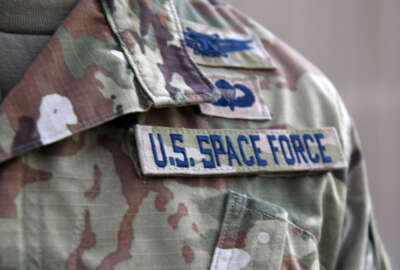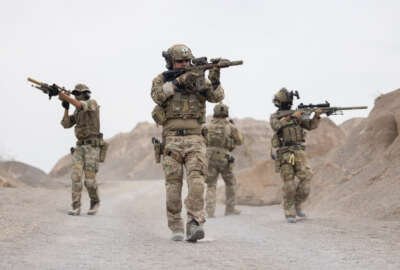Nominations for National Guard leaders languish, triggering concerns as top officers retire
The top four officers of the National Guard Bureau have left or are set to retire, and no nominations for their replacements have been confirmed by the Senate.
WASHINGTON (AP) — The top four officers of the National Guard Bureau have left or are set to retire in about two weeks, and to date no nominations for their replacements have been confirmed by the Senate, leaving the bureau, the Air Guard and the Army Guard without permanent leadership as they head into a busy hurricane season and a potentially challenging election period.
Gen. Daniel Hokanson, chief of the Guard Bureau, will retire at the beginning of August and Lt. Gen. Marc Sasseville, who was the vice chief, has already retired. Lt. Gen. Jon Jensen, who is chief of the Army Guard but has been serving as acting vice chief, will also retire in early August.
The lack of progress on the nominations has become a source of concern to the bureau, which oversees the training and oversight of the Guard and Reserve forces who deploy on federal duty for overseas combat and to protect the homeland. The Guard chief is a member of the Joint Chiefs of Staff, and serves as a key link to the adjutant generals who command the state Guard units across the country and its territories.
As an example, Guard troops from a number of states were called to Washington, D.C. to help secure the city after rioters attacked the U.S. Capitol on Jan. 6, 2020. They also, in their state active duty status, routinely respond to hurricanes, fires and other disasters, including during the COVID-19 pandemic.
As the retirements loom, the National Guard Association of the United States sent a letter to the leaders of the Senate Armed Services Committee.
Retired Maj. Gen. Francis M. McGinn, president of the association, said Friday that they are “shocked and disappointed in the process” and the fact that the White House hasn’t gotten nominations to the Senate.
He said that with the busy months ahead, having other officers serving temporarily in acting positions isn’t as effective as having a confirmed leaders in the job. In some cases, he said, they don’t have all the same authorities as those who are confirmed.
“A key part of having our chief on the Joint Chiefs is that direct line right to the secretary of defense. And that’s one of the benefits of having him in that room and in those discussions,” said McGinn.
The administration, he said, has known for several years that all four leaders – the chief, vice chief, Air Guard director and Army Guard director — would all be retiring this summer. The prospect has forced the bureau to juggle people around to cover the jobs, while nominations languish.
In March, the nomination of Maj. Gen. Duke Pirak to become the next Air Guard director was sent to the Senate to replace Lt. Gen. Michael A. Loh. Early last month, Loh retired, and Pirak has been serving as the acting director.
Just last week, the Senate received the nomination of Maj. Gen. Jonathan Stubbs, currently the adjutant general in Arkansas, to be the next director of the Army Guard, to replace Jensen.
No hearings or votes have been scheduled for either Stubbs or Pirak.
Meanwhile, the nominations for the top two slots — the chief and vice chief of the Guard – have not yet left the White House.
“Delays in the confirmation process can lead to gaps in leadership, disrupting operational continuity and potentially compromising our military’s ability to respond swiftly and effectively to emerging threats,” wrote McGinn in the letter to the committee’s chairman, Sen. Jack Reed, D-Rhode Island, and the ranking Republican, Sen. Roger Wicker of Mississippi.
According to officials, the Pentagon has recommended Air Force Lt. Gen. Steven Nordhaus as the next chief, and Army Maj. Gen. Joseph Jarrard as the vice chief. But their names haven’t been sent to the Senate. Officials spoke on condition of anonymity to discuss personnel movements.
Nordhaus is currently the commander of 1st Air Force and the North American Aerospace Defense Command’s (NORAD) continental U.S. region, which provides and controls airspace surveillance and activities for the U.S.
Jarrard has been serving as the director of operations for the Guard bureau.
Officials said that if Pirak is confirmed in the next week or two, he would likely serve as acting chief.
Copyright © 2024 The Associated Press. All rights reserved. This website is not intended for users located within the European Economic Area.






